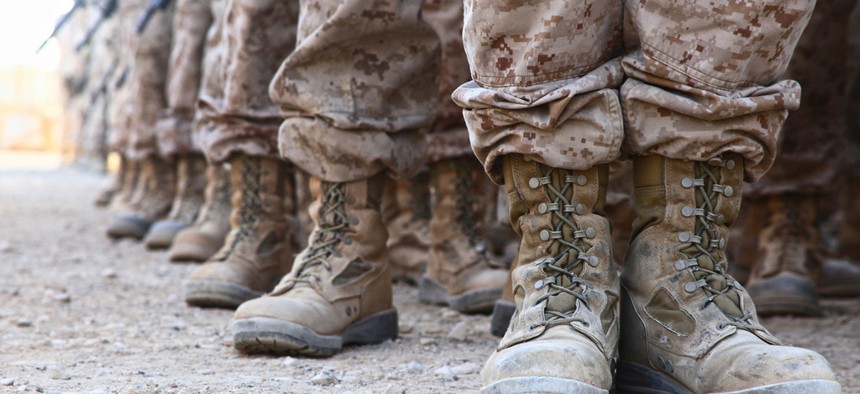
Defense Department file photo
Who Is Saying What About American Troops 'On the Ground' in Iraq?
The trouble with being both firm and flexible when it comes to military intervention in Iraq.
It's the fog of war rhetoric.
The Obama administration is calling on Congress to approve its plan to train and equip moderate Syrian rebels in the hopes of defeating the Islamic State, the terrorist organization that has come to occupy broad tracts of Iraq and Syria. The House approved the plan Wednesday; the Senate is expected to pass the measure Thursday afternoon. The overarching goal, President Obama has said, is to "to degrade and ultimately destroy this terrorist organization."
But Obama walks a tight line. While he calls for the destruction of IS in severe, absolute terms, he at the same time is stressing restraint in the use of American forces to do so. Since at least June, the president has been saying that no U.S. combat troops would be engaged in the conflict. Rather, the strategy is to send military advisers and equipment and target IS from the skies.
"As your commander in chief, I will not commit you and the rest of our armed forces to fighting another ground war in Iraq," Obama said during a speech at a Florida Air Force base Wednesday. Secretary of State John Kerry has been walking a similar line as Obama, declaringIS "must be destroyed," but also telling the Senate that "no country has been asked to put boots on the ground and no country is talking of it."
And yet, some of the president's top military deputies (and even his vice president) have added a shade of ambiguity to the message.
General Martin Dempsey, chairman of the Joint Chiefs of Staff, told the Senate Armed Services committee that as the military operation progresses, it is an open question as to whether he'd recommend to the president whether U.S. military personnel should accompany local forces in operations. "If we reach the point where I believe our advisers should accompany Iraqi troops on attacks against specific [IS] targets, I'll recommend that to the president," he said.
Army Chief of Staff Ray Odierno muddled the message further when he told reporters that a ground operation would be needed to oust IS for good. Now, he didn't specifically say that they had to be U.S. ground forces. "You've got to have ground forces that are capable of going in and rooting them out," he said, according to The New York Times.
"I think that by continuing to repeat that, the president in effect traps himself," Robert Gates, the former Defense secretary, said of Obama's insistence on "no boots" during an interview with CBS. The president has been "trapped" and held accountable for absolute declarations of policy before. "If you like your health care plan, you can keep it," will probably haunt his administration until he returns to civilian life. Also remember that Obama's firm "red line" against Syria's use of chemical weapons last summer turned out to be more of a red smudge when he delayed intervention for a drawn-out congressional debate on a potential intervention. When it comes to the pundit class, Obama will be criticized if a scenario arises that requires some U.S. combat troops in a ground assault, no matter the nuance of the situation.
The administration is trying to appear both firm and flexible when it comes to Iraq. White House press secretary Josh Earnest appeared on CNN Wednesday night to clarify the White House's rhetoric with the Pentagon's. It was a bit confusing.
"The president is determined that we're not going to put American combat troops on the ground in a combat role in Iraq and in Syria," he told Wolf Biltzer. "It's the proper role for the United States military to train and ramp up our training assistance in equipping to those Syrian opposition fighters."
Okay, so we're taking the lead in arming the rebels. But, but ...
"The second thing that's important for people to understand is, it's also important for the Iraqi government and for Syrian opposition fighters to understand that this is a mission that the United States military is not going to take on for them," Earnest said.
So while we're equipping Iraqis and Syrians they should know this is all up to them. However,American military personnel in the region, may, in certain situations, join with the local forces.
"What Chairman Dempsey said is entirely consistent with the policy that the president has laid out," Earnest assured Wednesday. "What [Dempsey] said is that he can imagine a scenario where he would ask and recommend to the president that some of those advisers forward deploy with Iraqi security forces to offer advice and assistance from those forward deployed locations, and that's different from a combat role."
Technically, those would be American troops in what could be a battle scenario. But, in Earnest's view, that doesn't break Obama's "no boots on the ground" declaration.
An operation to take out a complex terrorist network needs some ambiguity and wiggle room. But, it's going to be the case that these "no boots on the ground" statements will form the basis for evaluation of the military intervention in the region.







